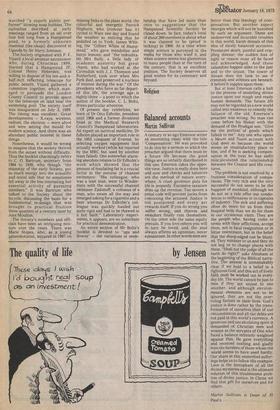Religion
Balanced accounts Martin Sullivan
A century or so ago Emerson wrote an interesting essay with the title 'Compensation'. He was provoked to do this by a sermon in which the preacher. argued that there must be a future life because the good things are so unfairly distributed in this one. Emerson takes the opposite view. Justice is really done here and now and checks and balances are the method of nature everywhere. A cruel governor puts his life in jeopardy. Excessive taxation dries up the revenue. Too severe a penal code will prevent juries from convicting the accused. Justice is not postponed and every act rewards itself. If you do wrong you suffer wrong, and thieves and swindlers finally ruin themselves. On the other side the same equity prevails. If you love others you will in turn be loved, and the soul always affirms an optimism, never a pessimism. In other words men are
better than this theology of compensation. But another aspect emerges which will not be banished by such an argument. There are undeserved and incurable troubles in this world, harsh denials of this idea of nicely balanced accounts. Premature death, painful and crippling disease, the sudden loss of sight or reason must all be faced and acknowledged. And these calamities happen alike to the just and to the unjust. The tower of Siloam does not look to see if criminals and atheists are beneatht it before' it topples upon them.
But at least Emerson calls a halt to the process of modelling divine justice upon our rough and ready human demands. The future life may not be regarded as a new world called into existence to remedy the balance of the old. Emerson's preacher was wrong. No man can come before his Maker with the demand of the Prodigal son, "Give me the portion of goods which falleth to me". Any one who opens a Meum and Tuum account with God does so because the world seems an unsatisfactory place to him, and if he is seeking compensation in the next he has sadly miscalculated the relationship between the Creator and His creatures.
The problem is not resolved by a fruitless consideration of comparisons. The very rich and the very successful do not seem to be the happiest of mankind, although we do not as a rule offer our condolences to millionaires or to captains of industry. The sick and suffering often do more for us from their hospital beds than we do for them in our occasional visits. They are the people who, having come to terms with their afflictions, accept them, not in fatal resignation or in bitter resentment, but in the belief that the sharp-edged can be blunted. They minister to us and they do not beg us to change places with them. "Shall not the judge of all the earth do right?" asks Abraham at the beginning of the Biblical narrative. The answer is unmistakably clear if we hold to a belief in a righteous God, and this act of lively faith must be worked out in everyday life. The world cannot be just to men if they are unjust to one another, and although environmental elements are not to be ignored, they are not the overruling factors in their lives. God's justice is done rather by the transformation of ourselves than of our circumstances and all Our debts are not paid in this world's currency. A generous and uncalculating spirit is demanded of Christian men and women as the servants of One who faced a balance infinitely weighted against Him. He gave everything and received nothing and gladly bore the burdens of those whom the world seems to have used hardly. Our share in this unmerited sufferings helps us to follow His example. Love is the hierophant of all the divine mysteries and is the ultimate solution of this troublesome problem of divine justice. In Christ we find that gift for ourselves and for others.
Martin Sullivan is Dean of St Paul's


































 Previous page
Previous page